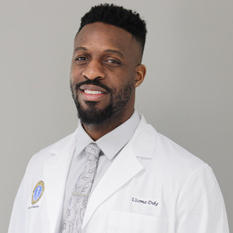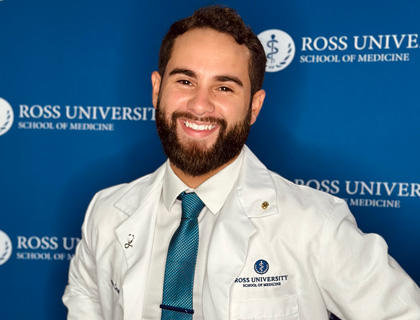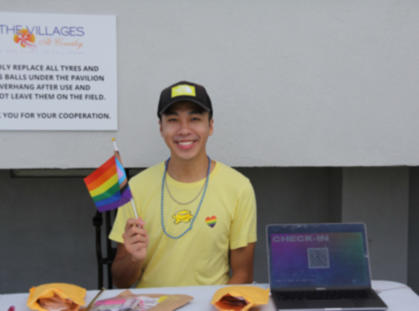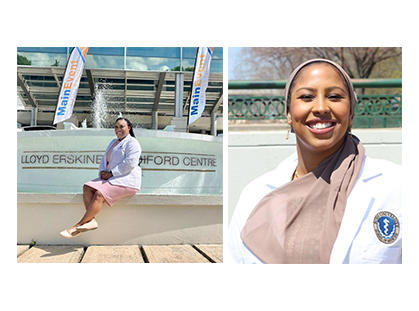His 6’5” athletic build coupled with his skin color screams basketball player to most strangers. Ross University School of Medicine (RUSM) student Uzoma Dike wants to stop the random yet frequent inquiries and be recognized for his smarts instead of his presumed sports ability.
“It’s like I don’t have a choice to be anything else,” he said, adding that he did play recreational ball in high school and college. “They see me and think they know who I am. I only get asked what sport I play instead of what I do for a living. I want to tell them I’m studying to become a doctor.”
Though heavy into sports during his younger years and still a big fan, this third-year student shifted his focus to academics once he hit college. The second oldest of six brothers said he finds medicine intriguing. “I want to figure out the problem and understand how muscles work. I want to take a holistic approach as a physician when I’m treating patients for injuries.”
Patience with Age
Uzoma, who’s considering a residency in family medicine with a fellowship in sports medicine or physical medication and rehabilitation, said he grew up in a diverse Houston, Texas community and didn’t experience blatant racism until college. He remembers being out with his roommate when a stranger shouted the derogatory N word. “I couldn’t believe this was happening. I felt full of rage.” Twelve years later, Uzoma said he’s learned patience and would react differently, perhaps offering education. “Instead of emotions rolling off the engine, it would probably be better to have a conversation and explain that it’s never ok to call me that. I think people use that language because they can or to get a reaction. They have this view of Black people and a sense of entitlement. If we get mad and assault this person, we’re only feeding the stereotype.”
One racial injustice, though subtle, forced him to reflect on the recurring disparities facing Blacks. Recently, two white girls crossed the street to avoid passing him. Books in hand, carrying a backpack and minding his own business, Uzoma was shocked and glanced back to find a reason for the direction change but came up shortchanged.
Erasing the Stereotype
Uzoma recounted a memorable sports radio broadcast, captivated by the morale of the story — “There was a fully armed cop with a taser, gun and bullet-proof vest along with an unarmed Black man who was acting calm and rational. The cop had every protection possible but was the one acting erratic. And yet the Black man was still considered the threat? That’s a misconception based on skin color alone.”
Sitting on the RUSM Diversity & Inclusion taskforce, Uzoma strives to enhance diversification training across all platforms and enforce a school environment in which minority students can speak without fear of judgment or repercussions based on race. He believes these goals are attainable and he’s also encouraged by the current marriage of Black and white protestors. “We’re moving in the right direction. I play Call of Duty and on the loading screen, it said Black Lives Matter. It’s little things like that that never happened before. I’m witnessing a lot of younger people from all walks of life coming together and all genuinely trying to be better. They’re raising awareness and that gives me hope that there will soon be equality for all people.”
RUSM Diversity and Inclusion Taskforce
A group of 16 RUSM students, faculty, colleagues and alumni have begun leading a holistic review of diversity and inclusion at the University and will deliver a report of short- and long-term recommendations within the next few months. This is the first of many steps to sustain change at the infrastructure level.
As RUSM prepares to engage, train, educate, advocate and invest in this process to align with the Black community at our University and in all the underrepresented and marginalized communities in which we serve, we invite others to share feedback with us because we know the fight for social justice is a community collaboration.




